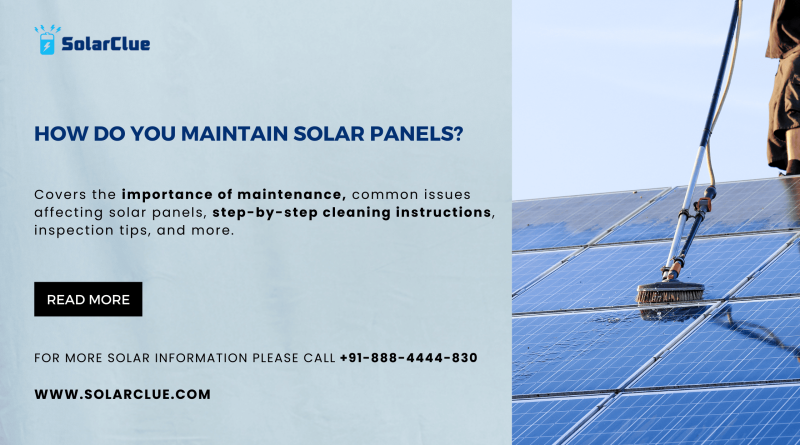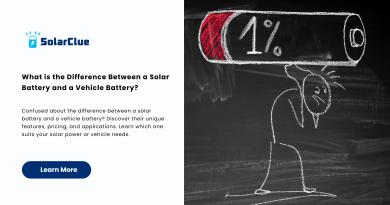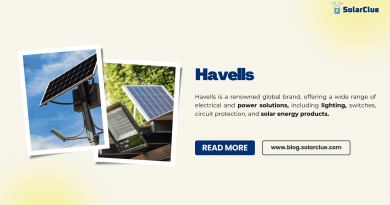How Do You Maintain Solar Panels?
Maintaining solar panels is crucial for ensuring optimal performance and longevity. Regular maintenance helps maximize energy production, prevent potential issues, and extend the lifespan of your solar power system. This blog covers the importance of maintenance, common issues affecting solar panels, step-by-step cleaning instructions, inspection tips, and more.
Table of Contents
- 1 The Importance of Solar Panel Maintenance
- 1.1 Common Issues Affecting Solar Panel Performance
- 1.2 Cleaning Solar Panels Safely and Effectively
- 1.3 Inspecting Solar Panels for Damage
- 1.4 Maintaining Solar Panel Racking and Wiring
- 1.5 Professional Maintenance vs. DIY
- 1.6 Creating a Solar Panel Maintenance Schedule
- 1.7 The Impact of Proper Maintenance on Solar Panel Lifespan
- 1.8 Conclusion
- 1.9 FAQs
The Importance of Solar Panel Maintenance
Regular maintenance of solar panels is essential for several reasons. Clean and well-maintained panels operate more efficiently, producing more electricity and saving money on energy bills. Maintenance also helps identify and resolve issues early, preventing costly repairs and prolonging the lifespan of the system.
Common Issues Affecting Solar Panel Performance
Several factors can affect the performance of solar panels:
- Dirt and Debris Accumulation: Dust, leaves, and other debris can block sunlight, reducing efficiency.
- Shading: Trees, buildings, or other obstructions can cast shadows on panels, decreasing their output.
- Weather-Related Damage: Hail, heavy snow, and strong winds can cause physical damage to panels.
- Bird Droppings and Nests: Birds can leave droppings or build nests on or around panels, impacting performance.
Cleaning Solar Panels Safely and Effectively
Recommended Cleaning Frequency
The frequency of cleaning depends on your location and environmental conditions. Generally, cleaning solar panels 2-4 times a year is sufficient.
Necessary Tools and Materials
- Soft brush or sponge
- Mild detergent
- Hose with a spray nozzle
- Safety equipment (gloves, ladder, harness if needed)
Step-by-Step Cleaning Instructions
Safety First: Turn off the solar panel system before cleaning.
Rinse Panels: Use a hose to rinse off loose dirt and debris.
Apply Cleaning Solution: Mix mild detergent with water and gently scrub the panels with a soft brush or sponge.
Rinse Again: Rinse off the soap with clean water, ensuring no residue is left.
Dry: Allow panels to air dry or use a squeegee for faster results.
Inspecting Solar Panels for Damage
Visual Inspection Techniques
- Check for cracks, chips, or scratches on the surface.
- Look for signs of discoloration or cloudiness.
- Inspect the mounting hardware for rust or corrosion.
Common Signs of Damage
- Reduced energy output
- Visible cracks or breaks
- Loose or exposed wiring
Using Monitoring Systems to Detect Issues
Many modern solar systems come with monitoring systems that provide real-time data on panel performance. Use these systems to detect anomalies and identify potential issues early.
Maintaining Solar Panel Racking and Wiring
Ensuring Secure and Stable Racking
- Regularly check that all bolts and fasteners are tight.
- Ensure that the mounting structure is not shifting or sagging.
Checking Wiring Connections
- Inspect all wiring for signs of wear, corrosion, or damage.
- Ensure that all connections are secure and insulated.
Preventing Corrosion and Wear
- Apply anti-corrosion spray to metal parts.
- Keep wiring and connections dry and protected from the elements.
Professional Maintenance vs. DIY
Benefits of Professional Maintenance Services
- Expertise in identifying and fixing issues
- Access to specialized tools and equipment
- Comprehensive inspection and cleaning
Cost Considerations
- Professional services may have a higher upfront cost but can prevent expensive repairs in the long run.
When to Call a Professional
- If you notice significant damage or a drop in performance
- If you are uncomfortable performing maintenance tasks yourself
Creating a Solar Panel Maintenance Schedule
Factors Influencing Maintenance Frequency
- Local climate and weather conditions
- Proximity to pollution sources (e.g., factories, highways)
- Presence of trees or bird activity
Sample Maintenance Schedule
| Task | Frequency |
|---|---|
| Visual inspection | Monthly |
| Performance monitoring | Monthly |
| Cleaning | 2-4 times a year |
| Professional inspection | Annually |
| Racking and wiring check | Every 6 months |
The Impact of Proper Maintenance on Solar Panel Lifespan
Regular maintenance significantly impacts the lifespan and performance of solar panels. Well-maintained panels can last 25-30 years or more, providing consistent energy production and maximizing return on investment.
Conclusion
Maintaining solar panels is essential for optimal performance, efficiency, and longevity. Regular cleaning, inspections, and professional maintenance can prevent issues, extend the lifespan of the system, and ensure maximum energy production. By following the guidelines in this guide, you can keep your solar power system running smoothly for years to come.
Here at SolarClue®, we offer a smart, practical, and “beautiful” solution. You will be answered for all the questions related to Solar.
We provide all kinds of brands that are the Best Solar panels in India.
If you are the one who is planning for the solar power system. Don’t hesitate to contact our team!
Looking forward to empowering you with solar energy, just like hundreds of our other clients!
FAQs
1. What are the signs that my solar panels need cleaning?
Reduced energy output, visible dirt or debris, and bird droppings are common signs that your panels need cleaning.
2. How often should I inspect my solar panels?
Monthly visual inspections and performance monitoring are recommended, with more thorough inspections every 6 months.
3. Can I clean my solar panels with just water?
Yes, water can be effective for light cleaning, but using a mild detergent helps remove stubborn dirt and grime.
4. What should I do if I find damage on my solar panels?
If you find damage, contact a professional for assessment and repair to prevent further issues.
5. Are there any safety precautions I should take when cleaning solar panels?
Always turn off the system before cleaning, use appropriate safety equipment, and avoid standing on panels or using harsh chemicals.



